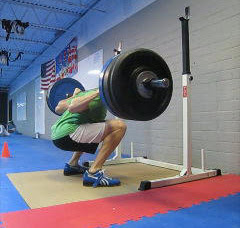Approximately 6 months ago, I walked into the charting office at the PRO Club and exclaimed, frustrated: "Why am I always hungry?! I'm eating almost 4000kcal/day, but it's not enough! I think about food all day!" To my surprise, I received a response, from at that time an unlikely candidate, Heather Gibbons: "What are you eating?"
I had been working at the PRO Club for about 1 1/2 years at this point, and I was fairly certain that I had my nutrition figured out. Through what I had learned in University in the few nutrition courses that I had taken, plus wisdom that I had gained through training clients in the club's metabolic disorders program, I was certain that I was eating an effective and highly nutritious diet. I ate 5 small meals/day, dispersed every 4 hours, with each meal consisting of approximately equal parts carbohydrate, protein, and fat (or so I thought, I really wasn't that diligent). I ate plenty of vegetables, fruits, lean protein, low-fat dairy, and whole grains. I limited my saturated fat and sugar intake, and tried to stay away from highly processed foods (although I never really questioned what it meant to be processed). The problem was, with all that I had learned, through implication, I wasn't seeing the results that I had come to expect. Although I was by no means overweight, I still had some annoying abdominal fat that I couldn't get rid of, I felt soft, and I was never satiated. I was frustrated, and willing at this point to accept a radical paradigm shift. Luckily for me, that shift was about to land on my lap, as Heather introduced me to the Paleo Diet.
The Paleo Diet, created by Dr. Loren Cordain, is based on the concept that the optimal diet for ideal body weight, optimal health, and peak athletic performance is one consistent with human genetic evolution. What does this mean in practice? Very simply, if it wasn't available to man prior to the Agricultural Revolution (approximately 500 generations ago, a blink of an eye by evolutionary standards), it shouldn't be eaten. This means no refined sugar, no processed food, no dairy, no grain, no legumes. The diet consists of lean meats, seafood, fruits, vegetables, and nuts.
The results that I saw were sudden and drastic. My energy levels increased and remained consistent throughout the day, I slept better, my hunger was manageable, and I lost approximately 20 pounds in a mere 6 weeks (I made some other dramatic changes to my lifestyle at this point, which I will discuss in future posts, but for the time being I would like to focus on the benefits of the Paleo Diet).
The mechanism through which the diet provides it's benefit is fairly simple: by eliminating foods from your diet that your body more than likely isn't equipped to digest properly, you optimize the health of your digestive system, improving the quality of your digestion. Combined with the fact that you are eliminating nutritionally sparse, calorically dense foods from your diet and replacing them with nutritionally dense foods, it's easy to see how and why the diet works so well.
Cordain, a member of the faculty of the Department of Health and Exercise Science at Colorado State University, has been researching the effects of diet on human health and specifically the links between modern diet and disease for the past 20 years. His published research is impressive, and I recommend that anyone interested in achieving optimal health at least browse though it.
When trying to grasp the concept of the Paleo Diet, don't get caught up in semantics. The value lies not in constantly questioning "would paleo man do this?" or "what would paleo man do in this situation?", relying on the diet as THE answer to all of your nutritional questions. The diet serves best as a template for determining food quality standards. The timing of meals and quantity of macronutrients that you should be consuming is governed by other concepts, which will be discussed in future posts.
Tuesday, December 12, 2006
Subscribe to:
Post Comments (Atom)


No comments:
Post a Comment